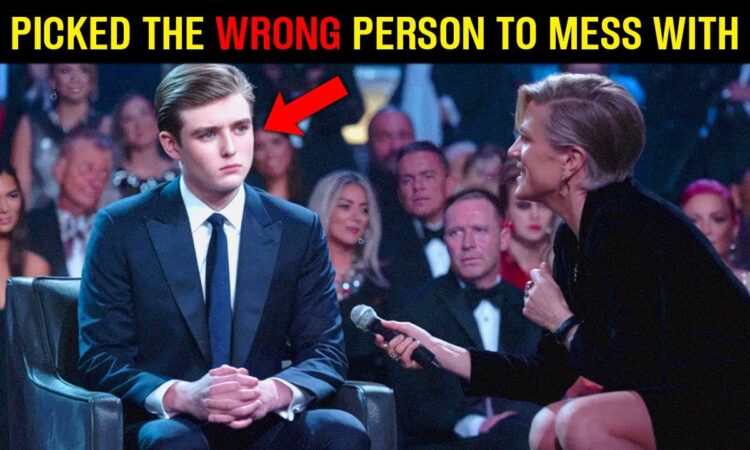Liberal Journalist MOCKS Barron Trump in Public – His Stunning Response Leaves Everyone Silent!

When a journalist mocked Barron Trump at a charity gala, no one expected his calm response to steal the show.
The ballroom at the Fairmont Grand Hotel was nothing short of breathtaking. Crystal chandeliers shimmered above rows of elegantly dressed attendees, their quiet hum of conversation adding to the grandeur of the annual charity gala. Among the crowd were some of the nation’s most influential figures—business moguls, actors, and journalists—all gathered to support a foundation dedicated to helping underprivileged youth.
The air was alive with energy, yet an undercurrent of anticipation buzzed as the evening’s keynote speaker prepared to take the stage. Seated toward the back, in a less conspicuous corner, was Barron Trump. At just 18 years old, his tall frame and stoic demeanor made him stand out, though not intentionally. He had been invited by a family friend, a quiet gesture meant to introduce him to a different circle. Unlike many attendees who thrived in the spotlight, Barron seemed content to observe, his piercing blue eyes scanning the room with a calmness that belied his age.
The gala had been moving along smoothly. A string quartet played softly in the background as wait staff glided through the room, serving delicate hors d’oeuvres and champagne. Conversations were warm, and laughter rippled through the crowd. Yet, as the night progressed, it became clear that the highlight everyone was waiting for was the speech.
The journalist, a celebrated figure in liberal media circles, had been announced weeks earlier as the evening’s keynote speaker. Known for their sharp wit and unapologetic opinions, they were revered by some and criticized by others for their fiery rhetoric. Tonight, they promised to deliver an address that would challenge perspectives and ignite thought.
As the MC introduced the journalist, there was a noticeable shift in the atmosphere. Conversations quieted, glasses were set down, and all eyes turned to the stage. Barron, too, leaned back slightly in his chair, his expression unreadable.
The journalist stepped up to the podium, a confident smile spreading across their face. Dressed impeccably in a sleek black suit, they exuded charisma. The audience responded with polite applause, but there was an edge of expectation. Would they push boundaries tonight, as they so often did?
What no one anticipated was just how much.
The journalist began with ease, their tone conversational and laced with charm. They joked about the city’s infamous traffic and shared a lighthearted anecdote about a past gala mishap involving a toppled champagne tower. Laughter rippled through the audience, breaking some of the initial tension. For a moment, it felt like any other high-profile event—polished, predictable, and harmless.
But soon, their tone shifted. What started as general commentary on politics and culture veered toward a more pointed critique. They referenced well-known political figures, poking fun at their quirks and missteps. Each jab drew chuckles and nods from parts of the crowd, but others exchanged glances, their smiles tightening.
Then, the focus landed squarely on Donald Trump.
“Well, we can’t talk about the state of the world without mentioning the man who made orange the new black,” the journalist quipped, drawing scattered laughter. “Love him or hate him, you have to admit he’s the gift that keeps on giving—for people like me.”
The crowd’s response was mixed. Some laughed openly, while others shifted uncomfortably in their seats. Barron, sitting quietly at his table, remained still, his expression unreadable. If the journalist noticed his presence, they didn’t let on—at least not yet.
The jokes kept coming, each one sharper than the last. The journalist moved on to Trump’s policies, his tweets, even his public appearances. The laughter began to thin out, replaced by a growing sense of unease among the attendees.
But the journalist wasn’t finished.
“And, of course,” they said, pausing for effect, “we can’t forget his most overlooked legacy—the next generation. I mean, let’s talk about Barron.”
A collective gasp rippled through the room. Heads turned toward Barron, who sat motionless, his face now the center of attention. The journalist’s tone remained playful, but the words carried a sting.
“Imagine growing up in a golden tower, surrounded by marble everything, and your dad tweeting about covfefe while the rest of us are just trying to survive Monday mornings. That must have been character-building.”
The attempt at humor fell flat. Some in the crowd chuckled nervously, but most sat in stunned silence.
The spotlight, unasked for and unwelcome, had landed squarely on Barron.
Instead of crumbling under the weight of the moment, Barron remained calm, his composure unshaken. What he would do next, however, would leave the entire room reeling.
The room seemed to hold its breath. All eyes were on Barron Trump—a young man thrust into the spotlight without warning. The journalist’s words lingered in the air, heavy and cutting, as the crowd waited for his reaction.
But Barron didn’t flinch. He didn’t shift in his chair or glance around nervously. Instead, he sat perfectly still, his expression calm but unreadable, his hands resting lightly on the edge of the table.
The silence grew louder with each passing second. A few people exchanged uneasy glances, their discomfort palpable. Even the journalist seemed to notice the tension, their confident smirk faltering ever so slightly as they glanced toward Barron’s table.
Perhaps they had expected a laugh or even a dismissive shrug—anything but this quiet defiance.
Baron finally stood, commanding attention. Every word he spoke afterward highlighted the weight of respect and dignity. His composed response left the room mesmerized and inspired global discussions on empathy and humanity.




